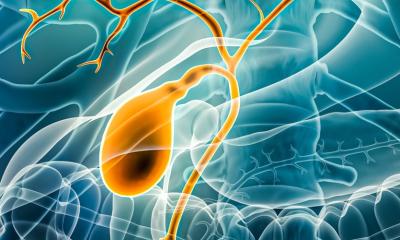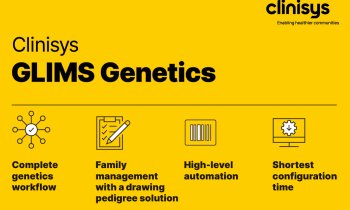Research
New Biomarker for cancer immunotherapy?
The Ligand PD-L1 is one of the most important targets for cancer immunotherapy with checkpoint inhibitors. But not all tumors have sufficient quantities of PD-L1 ligands on their surface. Scientists from the German Cancer Consortium (DKTK) have now shown that different types of cancer possess different quantities of PD-L1-Gen copies. Genetic analysis of the PD-L1 gene may in the future help to predict which patients will benefit from checkpoint inhibitors.

A hundred years ago, scientists had already put forward the hypothesis that the immune system recognizes cancer cells and eliminates them. But it was only recently that a major breakthrough was achieved with so-called checkpoint inhibitors. They act on the immune system's checkpoints. In a healthy person, these checkpoints prevent an exaggerated immune response. Tumors take advantage of the fact that these checkpoints suppress the immune response against them. And this is where the checkpoint inhibitors come in: They block the signaling pathway, effectively releasing the breaks of the immune system and thus giving the body's defenses the opportunity to attack the tumor.
PD-L1 can be used in diagnostic testing
The promising target structure to treat tumors with checkpoint inhibitors is the receptor for programmed cell death 1 (PD-1) which occurs on t-cells, and its ligand PD-L1, which occurs in most tumor cells. First, drugs canceling out the tumor-related break function in the immune defense via this checkpoint are already available on the market. "PD-L1 is also an interesting biomarker for diagnostic testing to predict the patients' response to the immunotherapy", explains Jan Budczies, bioinformatician at the DKTK partner institution Charité Berlin. "Current studies however show that the interrelationships are quite complex." Therefore, not all patients with PD-L1 in the tumor tissue responded to a therapy with PD-L1 blockers. On the other hand, treatment has been shown to be successful in patients where hardly any PD-L1 protein was detected in the tumors.
Tumors differ in the number of PD-L1 gene copies
In collaboration with scientists at DKTK sites in Berlin, München and Heidelberg, the team around bioinformatician Jan Budczies and pathologist Albrecht Stenzinger showed that tumors from many cancer types differ in the number of PD-L1 gene copies. In the tumor genomes of 9771 patients with 22 different cancer forms, including the most common such as lung, colon and breast cancer, the scientists found that quantities of copies of the PD-L1 gene and other neighboring genes were altered. The study showed that whenever gene copies were deleted or gained, the gene activity and the amount of PD-L1 protein in the tumor were frequently effected.
This study should help to optimize diagnostic tests for the deployment of checkpoint inhibitors, and to better understand tumor biology with regard to immunotherapy and other therapeutic methods. "We were able to show that the number of PD-L1 gene copies may be altered in different types of cancer", explains Albrecht Stenzinger from the Institute of Pathology of the University Hospital Heidelberg and the National Center for Tumor Diseases (NCT). "This affects not only PD-L1 itself, but also numerous neighboring genes, some of which are already known as driver genes for tumor diseases. Most tumors with increased quantities of PD-L1 gene copies also possess more copies of the gene for the JAK2 kinase, which plays a role in blood disorders and was recently identified as a target structure in a breast cancer subtype associated with a dismal prognosis."
PD-L1 gene copy number is a potential biomarker
Gene analyses can contribute to the identification of further target structures neighboring PD-L1. "Studies of this kind are extremely complex and can only be performed by an interdisciplinary team of medical experts and basic researchers. By combining the expertise of oncologists, bioinformaticians and pathologists, the DKTK offers ideal conditions", Albrecht Stenzinger enthuses. Jan Budczies, who is responsible for the bioinformatic part of the study points out that "big data analyses are an important tool of modern medicine. But for us to translate the results quickly into benefits for patients, scientists must collaborate on an interdisciplinary basis."
The analysis of PD-L1 Gen copy and PD-L1 Gen receptors may help to identify patients that will especially benefit from an immunotherapy with checkpoint inhibitors. Two recently published studies on the Hodgkin lymphoma have shown that PD-L1 Gen copy analysis is indeed relevant for clinical practice. Both, the progression of the disease and the success of the treatment with PD-1 signaling pathway inhibitors could be predicted on the basis of copy numbers of the PD-L1 gene. Budczies and Stenzinger's work suggests that this could also be the case for various other cancer types.
Publication:
Budczies, J. et. al.: Pan-Cancer Analysis of Copy Number Changes in Programmed Death-Ligand 1 (PD-L1, CD274) - Associations with Gene Expression, Mutational Load, and Survival. In: Genes, Chromosomes & Cancer (22. April 2016) DOI: 10.1002/gcc.22365
Source: German Cancer Consortium
02.08.2016











